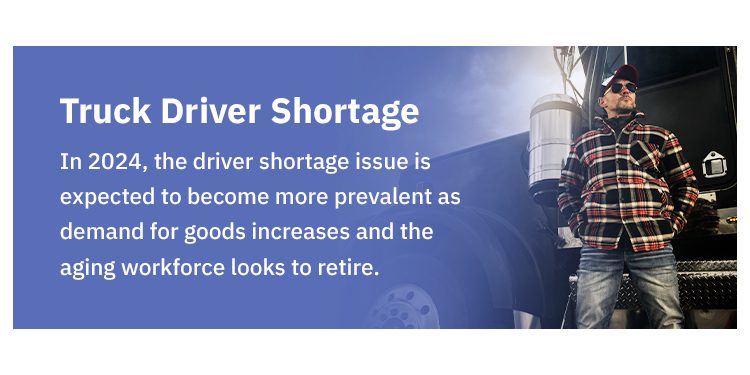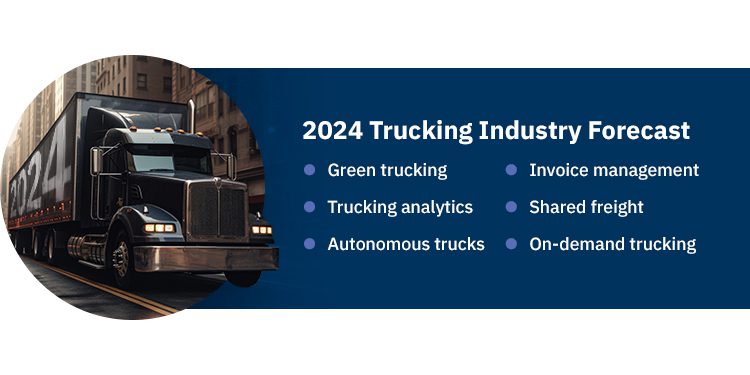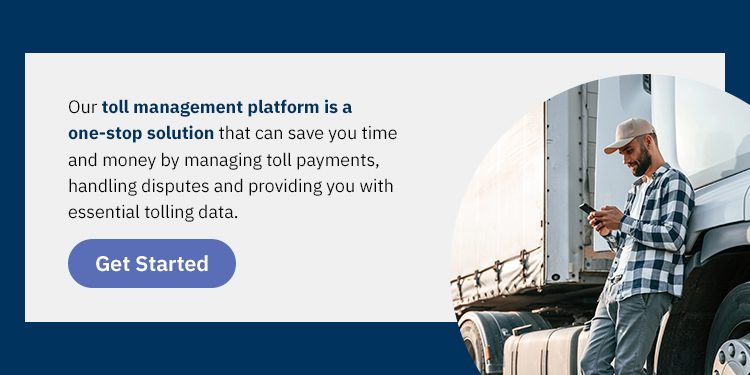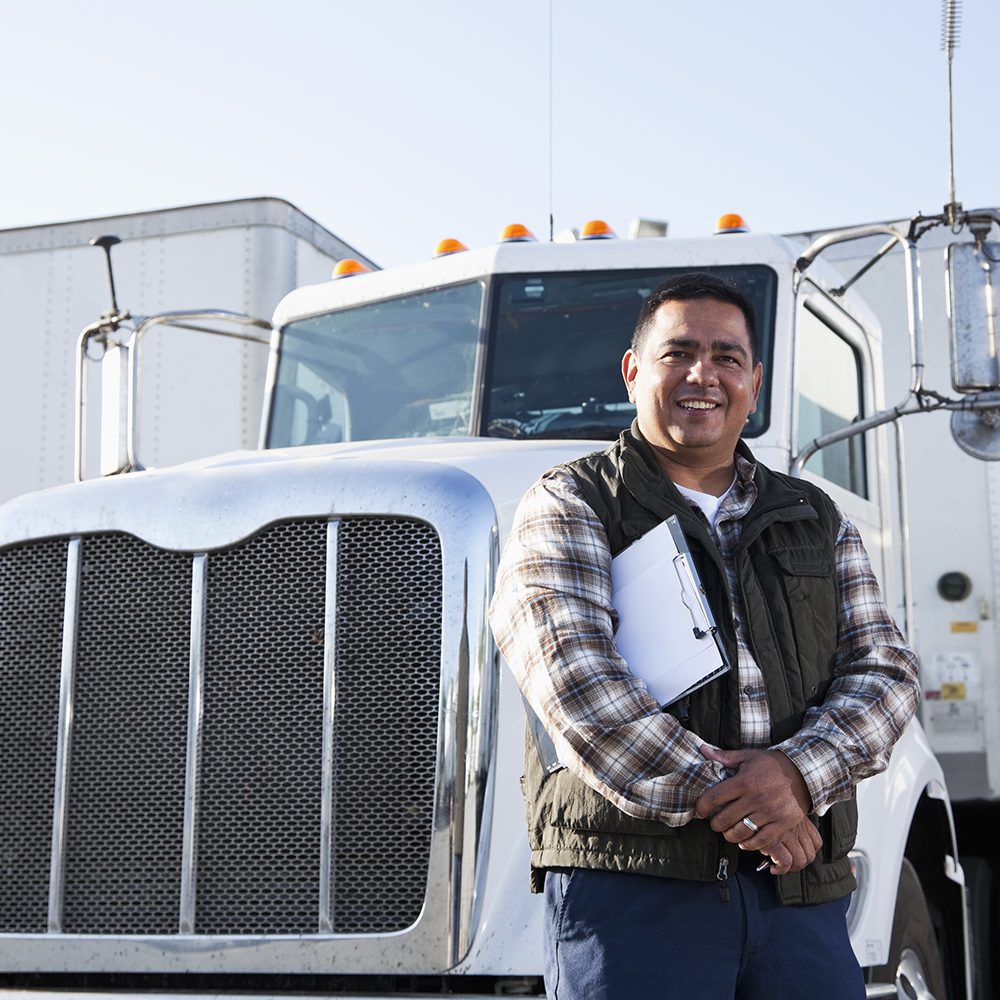
Trucking Industry Outlook for 2024
The trucking industry in the United States has faced multiple challenges over the last few years. Rising fuel costs, increasing insurance claims and driver shortages are just a few things that have impacted the trucking economy. The forecast for 2024 shows that many of these issues and others will continue to affect the trucking industry, but new solutions are actively being worked on. During the transition between 2023 and 2024, it is hard to get definitive answers to questions, like if trucking rates will go up in 2024.
Some trends, such as the growing use of technology and shifting consumer spending habits, are permanently changing the freight industry. Learn more about what is going on with the U.S. trucking industry in our trucking forecast for 2024.
Issues to Keep an Eye on
Several economic and labor-related issues have started affecting the trucking market over the last couple of years. In 2024, these issues will continue impacting trucking companies or become even more considerable challenges for the market.
These are some most significant issues facing the trucking economy in 2024:
Changing Labor Regulations
The passing of California’s Assembly Bill 5 is changing the industry’s view of independent contractors. Assembly Bill 5 states that anyone who provides labor or services in exchange for payment should be considered an employee rather than an independent contractor. The only time workers can be regarded as independent contractors is if they meet three criteria:
- They can work outside of the control of the employer.
- The tasks performed by the worker are outside of the typical business course of the employer.
- The worker is an established independent contractor or tradesperson.
Truck drivers are seen as employees according to the bill, as delivering cargo is the usual business of the trucking and transport industries. Other states may follow in California’s bartsteps and adopt similar regulations governing independent contractors and employees. These bills can affect how transport companies work, as employees and independent contractors are covered differently by labor laws.
Rising Cost of Insurance Premiums
A report by the American Transport Research Institute (ATRI) states that insurance premiums rose by 47% from 2009 to 2018 in response to the higher litigation payouts for accidents involving transport vehicles of any kind.
As insurance premiums increase to cover rising payout and litigation costs, transport companies of all sizes face financial uncertainty — but the impacts may be felt most strongly by smaller fleets. The continued threat of theft and increasing cost of commodities, labor and repairs, medical treatment and litigation fees are also likely to affect insurance premiums.

Truck Driver Shortage
The American Trucking Association (ATA) claims that the trucking industry may be short 160,000 drivers by 2030 unless action is taken. This has led to driver pay increasing as companies seek to attract and retain drivers. In 2024, the driver shortage issue is expected to become more prevalent as demand for goods increases and the aging workforce looks to retire. However, there are a few ways fleets can overcome this shortage in 2024, such as employing foreign drivers and recruiting more young people, women and minorities.
Equipment Shortage
The COVID-19 pandemic created a semi-truck shortage, and in 2023, companies still felt the after effects of this. Pressure from worldwide labor shortages, including in the U.S., resulted in lower manufacturing rates. Combined with global supply chain congestion, this pressure resulted in fewer new trucks being available on the market. In 2024, there are hopeful predictions that the market will slowly begin overcoming these shortages as other impacts from the pandemic even out.
Fuel Costs
The fuel cost is set to increase in 2024, with crude oil expected to reach an average cost of $96 per barrel. Meanwhile, retail prices for gasoline and diesel are expected to decrease. Gas prices in 2023 averaged $3.32 per gallon, but are expected to sit around $3.09 per gallon in 2024. Diesel prices will likely follow a similar trajectory, falling from $4.23 to $3.70 per gallon.

2024 Trucking Industry Forecast
A few trends will impact the freight market in 2024 on top of the sector’s labor and economic issues. Some of these trends include:
- Green trucking: The trucking industry emits a large quantity of greenhouse gases each year. Green trucking is a rising trend that intends to address these environmental issues. The trend focuses on the environmental impact of alternative fuel in the trucking industry. Hybrid and electric trucks and renewable energy sources are being used to lower gas emissions, noise pollution and fuel costs while improving air quality.
- Trucking analytics: Trucking analytics help overcome challenges like unpredictable maintenance needs, inefficient route planning and unoptimized loading. Using trucking analytics to manage fleets is predicted to be used far more by the trucking industry in 2024. Tools that help with route optimization, analyze driver behavior, predictive analytics and capacity utilization will revolutionize how fleets and trucking logistics are managed. Using AI, machine learning and cloud computing, trucking analytics has grown exponentially and will continue to do so as tools become more advanced and helpful.
- Autonomous trucks: Autonomous trucks or self-driving trucks, are a trend that will help with driver shortages, high operational costs and safety concerns. These trucks can operate without needing a human driver by using cameras, radar, sensors and AI to navigate roads, follow routes and avoid obstacles. There are a number of startups that are developing and testing autonomous trucking solutions. These companies are working on ways to improve how autonomous trucks react to different weather conditions, navigate different terrains and utilize real-time monitoring.
- Invoice management: Traditional paper-based invoicing in the trucking industry is slowly becoming a thing of the past. Using the digital and online tools that cater to the trucking industry will revolutionize logistics and management. Keep all your important documents in one place. Tracking all of your finances and client accounts has never been easier, thanks to the variety of software solutions available to fleet managers and trucking companies. By utilizing blockchains, AI and cloud computing, these tools are becoming more sophisticated as new functions are added.
- Shared freight: Shared freights involve sharing warehousing, routes, truck space and distribution centers with other shippers. Through the consolidation of other company’s shipments in a single truck, transport costs will be reduced, efficiency will be improved, the risk of damaging goods will be reduced and transit times will be much faster. Companies are leveraging technology like real-time tracking, mathematical algorithms and dynamic pricing to make shared freights an easy-to-manage and accomplishable goal.
- On-demand trucking: Trucks often return underloaded or empty, which is a waste of time and resources and produces a lot of unnecessary emissions. On-demand trucking aims to solve these challenges by providing transit and logistic companies with instant quotes, flexible capacity and real-time visibility. This trend can improve customer satisfaction and lower operational costs by making an entire trip as useful as possible. There are multiple startups that are working on helpful tools like real-time freight matching.
How Freight Companies Can Approach 2024
Knowing what issues the transport industry faces and some significant trends can help freight companies prepare for the year’s risks and opportunities and help your company weather the ups and downs. The biggest step you can take toward proactive action is streamlining your business and finding ways to reduce costs without impacting service delivery and driver safety.
One of the best ways to do this is by embracing technology. Fleet management software can help you monitor driver behavior, analyze fuel usage and implement effective preventive maintenance schedules. Toll management solutions are an effective tool that can make managing paying tolls easier and cheaper.
Using one system lets you manage all toll payment needs in one place, reducing the amount of admin for drivers, fleet managers and the accounting team. It can also reduce the number of costly violations resulting from unpaid tolls, making inter-regional trade easier and preserving crucial route information. Using a transponder and a toll pass solution can help drivers get through tolls quicker, easing congestion and helping them deliver goods on time.


